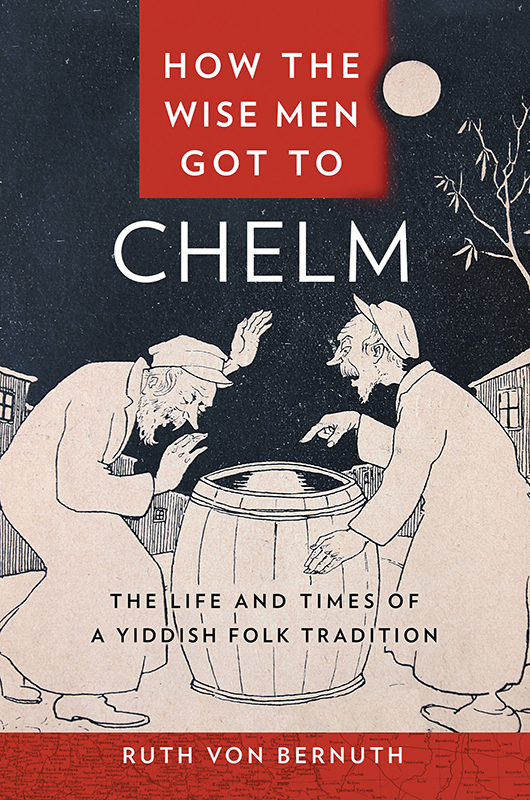
How the Wise Men Got to Chelm
How the Wise Men Got to Chelm
The Life and Times of a Yiddish Folk Tradition
Ruth von Bernuth

NEW YORK UNIVERSITY PRESS
New York
NEW YORK UNIVERSITY PRESS
New York
www.nyupress.org
2016 by New York University
All rights reserved
References to Internet websites (URLs) were accurate at the time of writing. Neither the author nor New York University Press is responsible for URLs that may have expired or changed since the manuscript was prepared.
Library of Congress Cataloging-in-Publication Data
Names: Bernuth, Ruth von., author.
Title: How the wise men got to Chelm : the life and times of a Yiddish folk tradition / Ruth von Bernuth.
Description: New York : New York University Press, [2016] | Includes bibliographical references and index.
Identifiers: LCCN 2016018942 | ISBN 978-1-4798-2844-9 (cl : alk. paper)
Subjects: LCSH: Folk literature, YiddishPolandChem (Lublin)History and criticism.
Classification: LCC GR98 .B47 2016 | DDC 398.209438/43dc23
LC record available at https://lccn.loc.gov/2016018942
New York University Press books are printed on acid-free paper, and their binding materials are chosen for strength and durability. We strive to use environmentally responsible suppliers and materials to the greatest extent possible in publishing our books.
Manufactured in the United States of America
10 9 8 7 6 5 4 3 2 1
Also available as an ebook
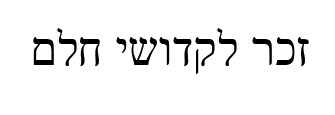
Contents
Many friends have joined me on the road to Chelm. I want to thank all the colleagues at the University of North Carolina at Chapel Hill who, since 2008, have made my professional life so agreeable and rewarding and who have given this project every possible encouragement. These include, in the Department of Germanic and Slavic Languages and Literatures, Eric Downing, Jonathan Hess, Clayton Koelb, Richard Langston, Radislav Lapushin, Priscilla Layne, Eleonora Magomedova, Hana Pichova, Inga Pollmann, Paul Roberge, Stanislav Shvabrin, Gabriel Trop, Ewa Wampuszyc, Christina Wegel, former colleagues Christopher Putney, Peter Sherwood, and Kathryn Starkey, and administrative manager Valerie Bernhardt; and, at UNCs Carolina Center for Jewish Studies, Yaakov Ariel, Karen Auerbach, Gabrielle Berlinger, Flora Cassen, Danielle Christmas, Marcie Cohen Ferris, Andrea Cooper, Maria DeGuzman, Michael Figueroa, Jeanne Fischer, Gregory Flaxman, Jonathan Hess, Joseph Lam, David Lambert, Jodi Magness, Evyatar Marienberg, Rosa Perelmuter, Yaron Shemer, Hanna Sprintzik, and Martin Sueldo, former faculty members Jonathan Boyarin and Christopher Browning, and communications director Karen Gajewski. Jonathan Hess, with his dual commitment to the Department of Germanic and Slavic Languages and Literatures and the Center for Jewish Studies, has been the best guide and role model possible.
The North Carolina Jewish Studies Seminar has afforded me the continual stimulus of a wide network of fellow researchers, within the Research Triangle and far beyond, thanks for which are due to its coordinators, Yaakov Ariel, Malachi Hacohen, and Julie Mell. The same is true of UNCs Program in Medieval and Early Modern Studies, under successive directors Kathryn Starkey, the late Darryl Gless, and Brett Whalen.
I am also grateful to my colleagues in the Department of Germanic Languages and Literature at Duke University, especially former colleague Ann Marie Rasmussen, and to the doctoral students of the Carolina-Duke Graduate Program in German Studiesin particular to Matt Feminella, Maggie Reif, and my exceptional advisees Janice Hansen, Annegret Oehme, and Emma Woelk, who let me divide my attention between them and the wise men. Emma, in addition, has worked with me on a separate project to translate Isaac Bashevis Singers Yiddish Chelm tales into English.
The College of Arts and Sciences at the University of North Carolina provided various research funds. I owe an additional debt to Bill Andrews, Jonathan Hess, and Clayton Koelb for the extra support they provided while I was working on this book away from Chapel Hill. Also indispensable was my year in Jerusalem as a Yad Hanadiv visiting fellow, and for this I am deeply grateful to the trustees of Yad Hanadiv and the Beracha Foundation, fellowships officer Natania Isaak-Weschler, and my inspirational mentors, Chava Turniansky and Moshe Rosman. Invaluable, too, was the time I was able to spend at the YIVO Institute in New York as a Vivian Lefsky Hort Memorial Fellow and in Greifswald as a fellow of the Alfried Krupp Wissenschaftskolleg. Special thanks to my co-fellows in Greifswald, academic director Christian Suhm, and administrative director Freia Steinmetz, for providing such a stimulating atmosphere.
I am immensely grateful to the staff of the UNC Chapel Hill Libraries, the Jewish Division of the New York Public Library, the Bodleian Library of the University of Oxford, the sterreichische Nationalbibliothek, the YIVO Institute in New York (especially Gunnar Berg and Paul Glasser), and the National Library of Israel (especially Aviad Stollman).
I am enormously grateful, too, for numerous extended, convivial, and illuminating conversations about Chelm and Jewish eastern Europe with Avri Bar-Levav, Valery Dymshits, Dov-Ber Kerler, Moshe Rosman, and Shaul Stampfer and about European foolish cultures with Katja Gvozdeva. Monika Adamczyk-Garbowska, Rachel Ariel, Karen Auerbach, Marc Caplan, Gerd Dicke, Mirjam Gutschow, Aya Elyada, Arndt Engelhardt, Amir Eshel, David Forman, Franziska Krah, Anna Kushkova, Radislav Lapushin, Ludger Lieb, Michael Lukin, Adi Mahalel, Eddy Portnoy, Oren Roman, Amy Simon, Gabriel Trop, Miriam Udel, Claudia Ulbrich, Eli Yassif, and Ewa Wampuszyc all generously shared their expertise to answer questions or identify sources, and Martin Kober was kind enough to contribute his cartographic skills.
The journalist Matti Friedmans interest in my project and his story about it in the Times of Israel resulted in a number of contacts with other Chelm aficionados, some with Chelm origins, for which I am also most grateful. In Jennifer Hammer, senior acquisitions editor at NYU Press, I am very fortunate to have found someone with not only a fondness for Chelm stories but also a willingness to envision them as a suitable subject for an academic book. I would also like to thank Constance Rosenblum, Shaul Stampfer, and an anonymous reader for the NYU Press for their many valuable comments on the manuscript.
Warm thanks to numerous fellow researchers and friends for their companionship and support, among them Cornelia Aust, Elisheva Baumgarten, Christfried Bttrich, Yaacov Deutsch, Ted Fram, Rachel Greenblatt, Sharon Gordon, Debra Kaplan, Agnes von Kirchbach, Henrike Lhnemann, Astrid Lembke, Werner Rcke, Claudia Rosenzweig, Dirk Sadowski, Friederike Seeger, Curt Stauss, Ruth Szlencka, Dagmar Vlker, Rebecca Wasowicz, Julia Weitbrecht, and Ido Wolff and to my esteemed Yiddish teachers Yitskhok Niborski, Sheva Zucker, and the unforgettable Pesakh Fiszman  . My greatest debt, among so many racked up in the course of this project, is to my longtime collaborator Michael Terry, who first proposed a systematic study of Chelm to me and kept urging me to pursue it and who, as interlocutor, critic, and editor, has been responsible for innumerable suggestions, corrections, and improvements, for which this book is immeasurably the better.
. My greatest debt, among so many racked up in the course of this project, is to my longtime collaborator Michael Terry, who first proposed a systematic study of Chelm to me and kept urging me to pursue it and who, as interlocutor, critic, and editor, has been responsible for innumerable suggestions, corrections, and improvements, for which this book is immeasurably the better.
Next page


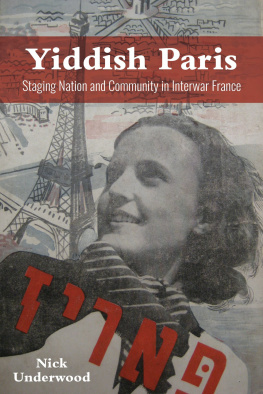
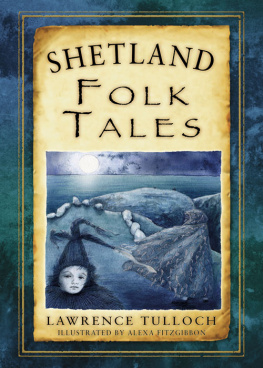
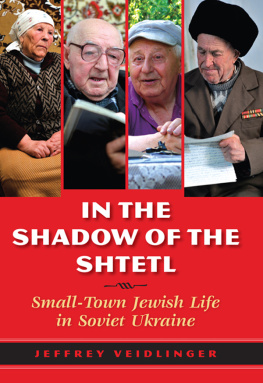
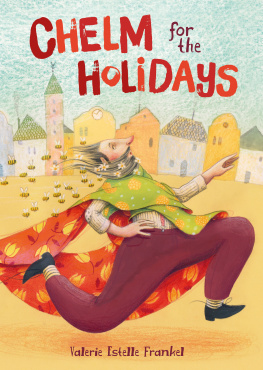
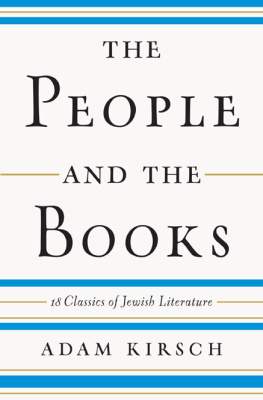
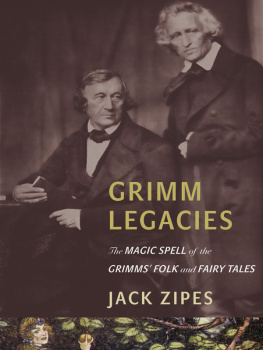



 . My greatest debt, among so many racked up in the course of this project, is to my longtime collaborator Michael Terry, who first proposed a systematic study of Chelm to me and kept urging me to pursue it and who, as interlocutor, critic, and editor, has been responsible for innumerable suggestions, corrections, and improvements, for which this book is immeasurably the better.
. My greatest debt, among so many racked up in the course of this project, is to my longtime collaborator Michael Terry, who first proposed a systematic study of Chelm to me and kept urging me to pursue it and who, as interlocutor, critic, and editor, has been responsible for innumerable suggestions, corrections, and improvements, for which this book is immeasurably the better.